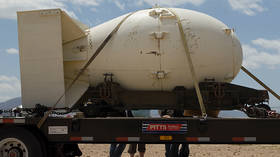Indian military doubles down on PM Modi’s ‘radar evading cloud’ theory
With several top Indian military officials defending Narendra Modi’s claim that clouds might in a way have helped Indian jets evade Pakistani radar during their raid on Balakot, online vigilantes have again ridiculed the theory.
“Very strong clouds and very strong convective conditions in clouds prevent the radar from detecting very accurately,” the chief of Western Air Command, Air Marshal Raghunath Nambiar said Monday, defending the controversial theory voiced by the Prime Minister earlier this month.
Also on rt.com Indian PM Modi ‘deservingly mocked’ for saying clouds could help IAF ‘escape’ Pakistani radarSharing his ‘raw wisdom’ of air combat tactics, Modi claimed that bad weather conditions contributed to the success of the Balakot air strike against a Jaish-e-Mohammed (JeM) terrorist camp deep inside Pakistani territory on February 26, because the clouds served as a shield from the enemy’s radar. While Twitter users found this logic puzzling, Air Marshal Nambiar was not the theory's only apologist within the Indian military.
“There are various kinds of radars working with different technologies. Some have the capacity to see through, some don't have the capacity to see through,” Army Chief General Bipin Rawat said over the weekend. “Some kinds of radar cannot see through clouds because of the manner in which it is operating. Sometimes we can, sometimes we can't.”
Critics, however, immediately dismissed the explanation as ridiculous, claiming that any advanced military radar features all-weather capabilities and doesn’t stop working on cloudy days – despite the fact that in higher frequency radars, accuracy can indeed be affected by weather conditions.
Any credible source, URL or research with supporting technical data to prove clouds help evade radars. Where is the need for someone in the armed forces to be a sycophant like this Air Marshal? #
— Patindia (@Patindia3) May 27, 2019
What an idiotic statement to make!
— Periyar's Tamil Nadu (@1977_Senthil) May 27, 2019
Clouds do affect radar readings. Inclement weather does. Congressis really need to read more. In this case about anomalous propagation, ducts, radar holes and shadows. At the moment it just appears that the entire party is full of Pappus.
— saurabh kishore (@wdamidoinhere) May 27, 2019
There's a limit of defending one silly statement!!!
— Jason Pereira (@PereiraJason96) May 27, 2019
Now India will conduct more air strikes hiding under the cloud to escape the radar and Pak/China will keep watching like a fool.
— Sarthak Kashyap (@sarthakkashyap4) May 27, 2019
Think your friends would be interested? Share this story!













